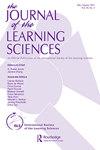超越个体:跨学习生态系统的社会情感实践的调节和协商
IF 3.9
1区 教育学
Q1 EDUCATION & EDUCATIONAL RESEARCH
引用次数: 1
摘要
在本文中,我们扩展了群体认知和调节的理论,以研究作为学习生态系统的一部分,调节是如何发生的。我们研究了我们的教学方法,嵌入式设计,它使用人机交互(HCI)作为学生理解他们的社会技术世界和人们围绕技术设计日常交互方式的渠道。方法我们的研究问题集中在识别(RQ1)需要学生集体管理的问题类型,我们的人群包括8-12岁的学习者,他们参加了一个以游戏为基础的课后HCI设计俱乐部。使用微观分析技术,我们检查了四个团队在九次会议上的HCI设计过程,以及四个学习者在两年多的时间里的HCI设计过程。我们确定了学生们遇到的最常见的问题,规则和谈判是如何在不同的分析水平上发挥作用的,随着时间的推移,参与者努力改进协作过程中发生了什么类型的学习,以及技术在这一过程中发挥的作用。在论文的最后,我们提出了一个嵌套集体知识构建过程如何随时间演变的模型,并讨论了我们的发现对K-12 HCI教育的影响。本文章由计算机程序翻译,如有差异,请以英文原文为准。
Beyond the individual: The regulation and negotiation of socioemotional practices across a learning ecosystem
ABSTRACT Background In this paper, we extend theories of group cognition and regulation to examine how regulation occurs as part of a learning ecosystem. We examine our instructional approach, Embedded Design, that uses Human-Computer Interaction (HCI) as a conduit for students to make sense of their sociotechnical world and the ways people design everyday interaction around technology. Methods Our research questions centered on identifying (RQ1) the types of problems that require students’ collective regulation, . Our population included learners aged 8-12 enrolled in a play-based after school HCI design club. Using micro-analytic techniques, we examined the HCI design processes of four teams over nine sessions and four learners over two years. Findings We identified the most common problems students encountered, how regulation and negotiation played out across different levels of analysis, what types of learning occurred as participants worked to improve collaborative processes over time, and the role that technology played in the process. Contribution We end the paper by proposing a model of how nested collective knowledge building processes evolve over time and discuss the implications of our findings for K-12 HCI education.
求助全文
通过发布文献求助,成功后即可免费获取论文全文。
去求助
来源期刊

Journal of the Learning Sciences
Multiple-
CiteScore
10.70
自引率
5.30%
发文量
17
期刊介绍:
Journal of the Learning Sciences (JLS) is one of the two official journals of the International Society of the Learning Sciences ( www.isls.org). JLS provides a multidisciplinary forum for research on education and learning that informs theories of how people learn and the design of learning environments. It publishes research that elucidates processes of learning, and the ways in which technologies, instructional practices, and learning environments can be designed to support learning in different contexts. JLS articles draw on theoretical frameworks from such diverse fields as cognitive science, sociocultural theory, educational psychology, computer science, and anthropology. Submissions are not limited to any particular research method, but must be based on rigorous analyses that present new insights into how people learn and/or how learning can be supported and enhanced. Successful submissions should position their argument within extant literature in the learning sciences. They should reflect the core practices and foci that have defined the learning sciences as a field: privileging design in methodology and pedagogy; emphasizing interdisciplinarity and methodological innovation; grounding research in real-world contexts; answering questions about learning process and mechanism, alongside outcomes; pursuing technological and pedagogical innovation; and maintaining a strong connection between research and practice.
 求助内容:
求助内容: 应助结果提醒方式:
应助结果提醒方式:


